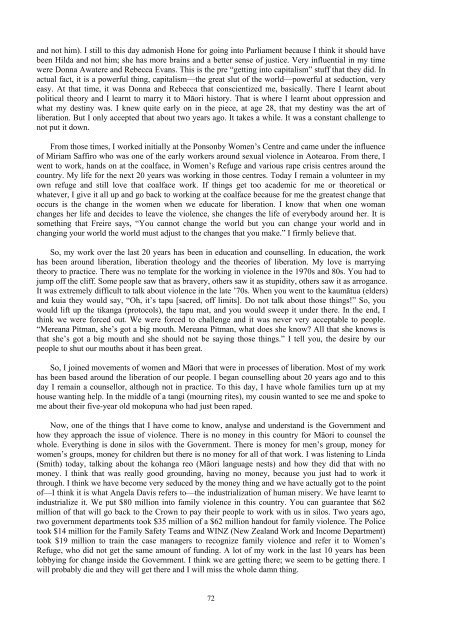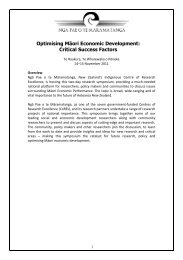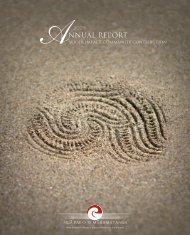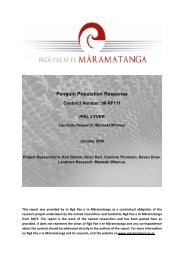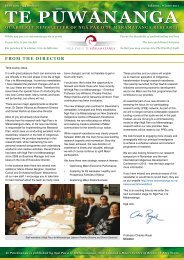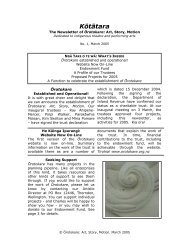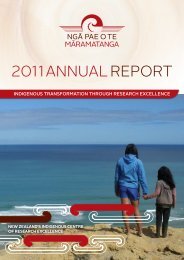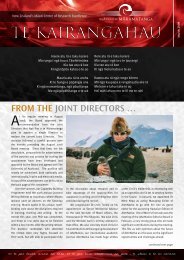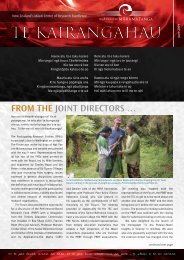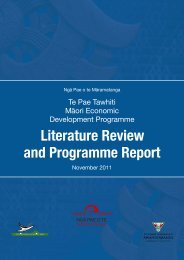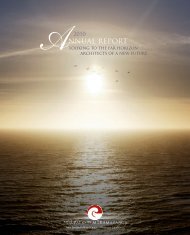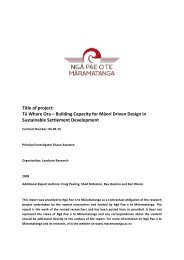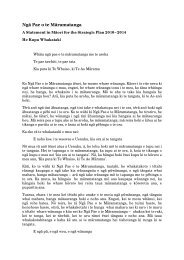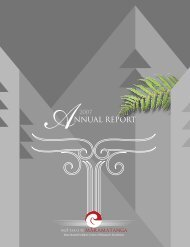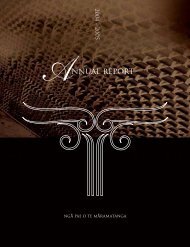traditional knowledge conference 2008 te tatau pounamu
traditional knowledge conference 2008 te tatau pounamu
traditional knowledge conference 2008 te tatau pounamu
You also want an ePaper? Increase the reach of your titles
YUMPU automatically turns print PDFs into web optimized ePapers that Google loves.
and not him). I still to this day admonish Hone for going into Parliament because I think it should havebeen Hilda and not him; she has more brains and a bet<strong>te</strong>r sense of justice. Very influential in my timewere Donna Awa<strong>te</strong>re and Rebecca Evans. This is the pre “getting into capitalism” stuff that they did. Inactual fact, it is a powerful thing, capitalism—the great slut of the world—powerful at seduction, veryeasy. At that time, it was Donna and Rebecca that conscientized me, basically. There I learnt aboutpolitical theory and I learnt to marry it to Māori history. That is where I learnt about oppression andwhat my destiny was. I knew qui<strong>te</strong> early on in the piece, at age 28, that my destiny was the art ofliberation. But I only accep<strong>te</strong>d that about two years ago. It takes a while. It was a constant challenge tonot put it down.From those times, I worked initially at the Ponsonby Women’s Centre and came under the influenceof Miriam Saffiro who was one of the early workers around sexual violence in Ao<strong>te</strong>aroa. From there, Iwent to work, hands on at the coalface, in Women’s Refuge and various rape crisis centres around thecountry. My life for the next 20 years was working in those centres. Today I remain a volun<strong>te</strong>er in myown refuge and still love that coalface work. If things get too academic for me or theoretical orwha<strong>te</strong>ver, I give it all up and go back to working at the coalface because for me the grea<strong>te</strong>st change thatoccurs is the change in the women when we educa<strong>te</strong> for liberation. I know that when one womanchanges her life and decides to leave the violence, she changes the life of everybody around her. It issomething that Freire says, “You cannot change the world but you can change your world and inchanging your world the world must adjust to the changes that you make.” I firmly believe that.So, my work over the last 20 years has been in education and counselling. In education, the workhas been around liberation, liberation theology and the theories of liberation. My love is marryingtheory to practice. There was no <strong>te</strong>mpla<strong>te</strong> for the working in violence in the 1970s and 80s. You had tojump off the cliff. Some people saw that as bravery, others saw it as stupidity, others saw it as arrogance.It was extremely difficult to talk about violence in the la<strong>te</strong> ’70s. When you went to the kaumātua (elders)and kuia they would say, “Oh, it’s tapu [sacred, off limits]. Do not talk about those things!” So, youwould lift up the tikanga (protocols), the tapu mat, and you would sweep it under there. In the end, Ithink we were forced out. We were forced to challenge and it was never very acceptable to people.“Mereana Pitman, she’s got a big mouth. Mereana Pitman, what does she know? All that she knows isthat she’s got a big mouth and she should not be saying those things.” I <strong>te</strong>ll you, the desire by ourpeople to shut our mouths about it has been great.So, I joined movements of women and Māori that were in processes of liberation. Most of my workhas been based around the liberation of our people. I began counselling about 20 years ago and to thisday I remain a counsellor, although not in practice. To this day, I have whole families turn up at myhouse wanting help. In the middle of a tangi (mourning ri<strong>te</strong>s), my cousin wan<strong>te</strong>d to see me and spoke tome about their five-year old mokopuna who had just been raped.Now, one of the things that I have come to know, analyse and understand is the Government andhow they approach the issue of violence. There is no money in this country for Māori to counsel thewhole. Everything is done in silos with the Government. There is money for men’s group, money forwomen’s groups, money for children but there is no money for all of that work. I was lis<strong>te</strong>ning to Linda(Smith) today, talking about the kohanga reo (Māori language nests) and how they did that with nomoney. I think that was really good grounding, having no money, because you just had to work itthrough. I think we have become very seduced by the money thing and we have actually got to the pointof—I think it is what Angela Davis refers to—the industrialization of human misery. We have learnt toindustrialize it. We put $80 million into family violence in this country. You can guaran<strong>te</strong>e that $62million of that will go back to the Crown to pay their people to work with us in silos. Two years ago,two government departments took $35 million of a $62 million handout for family violence. The Policetook $14 million for the Family Safety Teams and WINZ (New Zealand Work and Income Department)took $19 million to train the case managers to recognize family violence and refer it to Women’sRefuge, who did not get the same amount of funding. A lot of my work in the last 10 years has beenlobbying for change inside the Government. I think we are getting there; we seem to be getting there. Iwill probably die and they will get there and I will miss the whole damn thing.72


